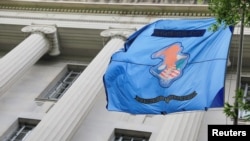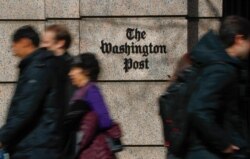News that the U.S. Justice Department under former President Donald Trump seized phone records of three Washington Post reporters has ignited concerns about government interference in journalists' work.
Although such seizures are rare, journalists and First Amendment advocates have highlighted the negative impact they have on reporting, and are pushing the Justice Department to reveal more about its decision to obtain the records.
The Post reported May 7 that Trump's Justice Department obtained phone records from three national security reporters, covering a period from April to July 2017.
The records included phone numbers of calls made to and from the targeted phones and the duration of each call, according to the Post. They did not include the content of the conversations.
The Post first learned of the seizure in May, when it received letters from the Justice Department. The letters did not disclose the purpose of the seizure, according to the Post, but during the timeframe, the reporters co-wrote stories on Russia's interference in the 2016 election.
It is hard to gauge how often subpoena requests for media records are made and the factors involved when they are granted or dismissed, said Ken Paulson, director of the Free Speech Center at Middle Tennessee State University.
But when the cases do arise, they often include factors that trouble First Amendment experts.
The incident has renewed calls for the Justice Department to explain its guidelines for handling such requests, with media advocates pointing to weaknesses that could allow for surveillance of journalists and sources, which in turn could inhibit reporting.
"[Journalists] are among the people in our society who keep an eye on government power and abuses of power," said Lucy Dalglish, who noted a ramping up of leak prosecutions during her 12 years as executive director of the Reporters Committee for Freedom of the Press (RCFP). "You can't do that unless you have independently gathered, high-quality information."
Need for transparency
Under Justice Department guidelines, the attorney general must sign off on a subpoena for reporter records and any seizures of news records should be treated as "extraordinary measures, not standard investigatory practices."
The guidelines state that the affected member of the media must be notified beforehand unless "such notice would pose a clear and substantial threat to the integrity of the investigation, risk grave harm to national security, or present an imminent risk of death or serious bodily harm."
In the case of the Post, the journalists were not told of the subpoena for their records until after it had taken place.
"The fact that they didn't notify here is of significant concern for the First Amendment and press freedom generally," Gabe Rottman, director of RCFP's Technology and Press Freedom Project, told VOA.
The RCFP has called on the Justice Department leadership to explain why the records were seized and why it decided advance notification was not required in this case.
The Department of Justice did not respond to VOA's emails requesting comment.
The Post cited a spokesperson who said that the department followed "established procedures" and that the target of the investigation was not journalists "but rather those with access to the national defense information who provided it to the media and thus failed to protect it as lawfully required."
Danielle Brian, executive director of the independent government watchdog Project on Government Oversight (POGO), believes the current Justice Department guidelines are "inadequate." She said they are not codified into law and don't reflect the "bright-line that should exist between the Justice Department's surveillance capacities and journalists."
Brian said she would like Congress to pass a federal shield law that the Senate Judiciary Committee approved in 2009 that would protect journalists from government overreach. But there are obstacles to that becoming a reality.
"The principal problem is precisely what you're seeing the Justice Department argue now," Brian said. "They want to have the flexibility to decide when they will exercise their surveillance powers without accountability and scrutiny."
Implications on reporting
Paulson, of Middle Tennessee State University, acknowledged that systems should be in place to protect state secrets. But, he said, the system to protect that information could be abused.
"If someone were indeed leaking state secrets that endanger the United States of America, you would want to have a system where the government could investigate where these highly damaging leaks occur," Paulson told VOA. "The problem is ... there's always the danger that those in power will abuse it to ferret out perceived enemies and even the score."
And when the government abuses that system, Paulson said, there are dangerous implications.
"If you give government too much latitude in pinning reporters to the wall and demanding to know their sources, you will chill all those sources," he said. "Their actions are only in part to obtain information. It's also to send a warning shot to anyone else who might consider cooperating with the press."
Kathleen Carroll, the board chair of the Committee to Protect Journalists (CPJ), said the federal government often claims the seizure of journalists' records is necessary to protect national security. While those concerns are sometimes legitimate, Carroll believes the system remains "ripe for abuse."
"The scariest thing is the idea that the federal government can just decide to go rooting around in sock drawers of journalists and say, 'Oh, national security. And we don't have to tell you any more about that because it's a national security issue,' " Carroll said.
Focus on leaks
The U.S. ramped up its prosecutions of those leaking information during Barack Obama's presidency, with at least 10 prosecutions — a higher figure than all the previous administrations combined.
As part of those efforts, the Justice Department dug into communications between reporters and their sources.
The most prominent incident came in 2013, when the Justice Department seized phone records from the Associated Press without notice. The department had initiated a leak investigation following a series of stories in May 2012 about a CIA operation.
The AP reported at the time that the subpoena affected more than 20 phone lines assigned to the news agency and its staff, in offices where at least 100 journalists worked on stories about the government and other issues.
"We protested ferociously," Carroll, who was the AP's executive editor and senior vice president at the time, told VOA. "The government shouldn't be mucking around in phone records of legitimate journalists, legitimate businesses."
The department ultimately revised its guidelines.
Dalglish, who is now dean of the University of Maryland's journalism school, said the crackdown during the Obama administration came at a time when the world was becoming more connected, and the release of documents from WikiLeaks escalated fears among government officials.
"They felt they needed to stop [the leaks], and they needed to put whatever pressure they could, wherever they could," Dalglish told VOA.
The trend continued under the last administration, including a case of federal prosecutors seizing records of a New York Times journalist in 2018. The seizure was part of a Justice Department investigation into a Senate Intelligence Committee aide suspected of leaking information.
"There seems to be a pattern of presidents getting aggressive towards the press," said Paulson, of Middle Tennessee State University. "When you are in power, you value control. And suddenly the press is in your crosshairs."
Editor's Note: Lucy Dalglish is the dean of the Philip Merrill College of Journalism at the University of Maryland. The reporter of this article is currently a student at Merrill College but is not enrolled in any of Dalglish's classes.
Also, this article has been corrected in graph 29 to clarify that the subpoena related to AP records affected more than 20 phone lines.





